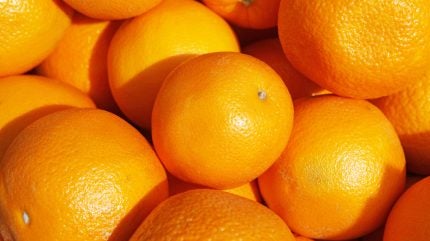
A dispute between South Africa and the European Union (EU) over citrus fruit exports to the bloc is to be settled at the World Trade Organization (WTO).
South Africa’s government said in a statement it has requested consultations with the EU at the WTO in relation to phytosanitary trade regulations imposed on its citrus exports.

Discover B2B Marketing That Performs
Combine business intelligence and editorial excellence to reach engaged professionals across 36 leading media platforms.
The EU is a major market for South African citrus fruit.
The dispute centres around citrus black spot (CBS), a fungal infection that affects citrus fruit.
The EU enforces measures on South African citrus growers, including a detailed spray programme and inspections at orchards and packhouses. South Africa says such precautions are unnecessary and create significant financial burdens for its citrus industry.
In the statement revealing its intervention request for the Switzerland-based WTO, which deals with the rules of trade between nations, the South African government said: “This action was initiated to find a lasting solution to the EU’s phytosanitary regulations on citrus black spot in order to protect the livelihoods of tens of thousands of people in the local citrus industry.”

US Tariffs are shifting - will you react or anticipate?
Don’t let policy changes catch you off guard. Stay proactive with real-time data and expert analysis.
By GlobalDataIt said the move has the support of the Citrus Growers’ Association of Southern Africa (CGA).
The government repeated its view that the measures taken by the EU to deal with CBS are unnecesary.
“CBS is a fungal infection that can result in cosmetic blemishes on the affected fruit. Despite the world’s leading scientists proving that CBS cannot be transmitted through the actual fruit as a pathway, the EU has continued to enforce measures on South African citrus growers,” it said.
Thoko Didiza, South Africa’s Minister of Agriculture, Land Reform and Rural Development, said: “Rural economies throughout the country depend on the export of citrus for their income. Currently, the industry cannot afford the almost R2bn ($105.4m) that is needed to comply with the EU’s trade restrictive regulations.”
Justin Chadwick, CEO of the CGA, added: “The industry welcomes [the] government’s actions and the industry is hoping for efficient resolution of the matter in view that the consultations are initiated as this year’s citrus export season commences.
“Projections show that if all industry stakeholders come together, the industry will be able to produce an additional 100 million 15kg cartons over the next eight years. This can create 100,000 more jobs and generate an additional R20bn in annual revenue, but this potential will surely be lost if the EU market narrows.”
Just Food asked the EU for its response to South Africa’s move.
Olof Gill, a spokesperson for trade and agriculture, said: “The EU can confirm that it has received a request for consultations from South Africa regarding its legislation to prevent introduction in the Union of citrus black spot via imports of citrus fruits.
“The EU regrets that South Africa has chosen to pursue WTO consultations regarding this matter.
“The EU will study the request for consultations and will enter into consultations in good faith with South Africa. The EU is confident that its legislation is in full compliance with its obligations under WTO.”





